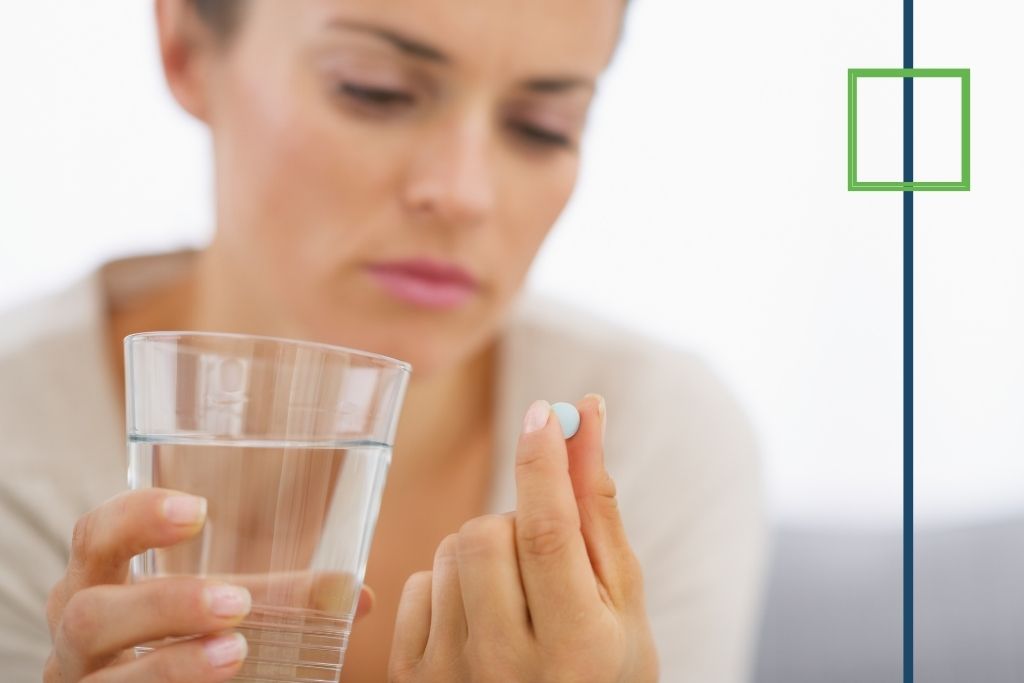What is Diphenhydramine?
Diphenhydramine is the main ingredient in Benadryl, an antihistamine used to treat itching and pain caused by cuts, insect bites, poison ivy, and poison oak. Diphenhydramine can also treat symptoms of allergies, hay fever, and cold symptoms. This drug targets histamine H1 receptors, reducing allergy symptoms (from the term “antihistamine”). Histamine is a natural chemical in our body that defends the immune system from allergens. An allergic reaction happens when the body releases a large amount of histamines. Diphenhydramine is also used to treat motion sickness, induce sleep, and treat certain symptoms of Parkinson’s disease.
In addition to relieving allergy symptoms, it’s also known for causing raised energy and mild euphoria in its users. As a result, many people have started abusing this medication. This is according to the National Center for Biotechnology Information (NCBI) [1]. Moreover, because it’s an over-the-counter (OTC) drug, almost anyone can get it. While some States make it illegal for someone under the age of 18 to obtain Benadryl and other over-the-counter medicines containing diphenhydramine, cases of misuse and even addiction have been reported. Diphenhydramine addiction withdrawal is a real threat. Someone who abruptly stops taking this drug after they’ve become addicted may suffer from severe withdrawal symptoms.

Diphenhydramine (DPH) is also a powerful competitive antagonist of muscarinic acetylcholine receptors and can cause sinus tachycardia, mydriasis, xerostomia, blurred vision, ileus, urinary retention, central nervous system (CNS) depression, agitation, hyperactivity, or psychosis [2]. Given widespread and unrestricted use of this medication, it is important to recognize signs and symptoms of chronic diphenhydramine (DPH) abuse and acute withdrawal to provide timely and effective treatment while avoiding the use of unnecessary and potentially harmful medications.
Brand and Generic Names For Diphenhydramine
DPH is available both as over-the-counter and prescription under numerous Generic and Brand Names. Some of these products include:
Over-The-Counter Oral Diphenhydramine Preparations
- Aleryl
- Alledryl
- Banophen
- Basic Care Allergy Relief
- Basic Care Nightime Sleep Aid
- 7 Select Allergy
- 7 Select Allergy Children
- 7 Select Night Time Sleep Aid
- Diphen
- Dibondrin
- Desentol
- Dipheyst
- Dimedrol
- Benadryl
- Benadryl Allergy
- Benylin Cough and Cold
- Circle K antihistamine
- Dormarex 2

Get Your Life Back
Find Hope & Recovery. Get Safe Comfortable Detox, Addiction Rehab & Mental Health Dual Diagnosis High-Quality Care at the We Level Up Treatment Centers Network.
Hotline (877) 378-4154Diphenhydramine Side Effects
The U.S. Food and Drug Administration (FDA) [3] is warning that taking higher than recommended doses of the common over-the-counter (OTC) allergy medicine diphenhydramine (Benadryl) can lead to serious heart problems, coma, seizures, or even death. FDA is aware of news reports of people ending up in emergency rooms or dying after participating in the “Benadryl Challenge” encouraged in videos posted on the social media application.
Get emergency medical help if you have any signs of an allergic reaction to this medicine: hives (difficult breathing), swelling of the face, tongue, lips, or throat.
Stop using this medicine and call your doctor at once if you have [4]:
- Painful or difficult urination
- Little or no urinating
- Pounding heartbeats or fluttering in your chest
- Confusion, feeling like you might pass out
- Tightness in your neck or jaw, uncontrollable movements of your tongue
Common diphenhydramine side effects may include:
- Dry mouth, nose, or throat
- Dizziness, drowsiness, loss of coordination
- Dry eyes, blurred vision
- Constipation, upset stomach
- Day-time drowsiness or “hangover” feeling after night-time use.
Diphenhydramine Addiction Symptoms
Although many people believe over-the-counter (OTC) drugs aren’t addictive, you can become addicted to this particular drug. In fact, addiction to this medication has become a growing concern.

Much of the confusion behind diphenhydramine misuse is that many people believe it’s safe because they can just go to the drugstore and get it on their own. However, addiction o this medicine has become a problem for most people who have relied on Benadryl to treat their allergy symptoms or for sleep.
Like any other prescription drug dependency, Benadryl dependency happens when someone is psychologically dependent on it. The individual cannot work or carry out their day without taking diphenhydramine. This usually begins with regular use of normal doses. In particular, those who use this medication to sleep may develop a tolerance to their usual dose and may require more of it to experience the same effects.
Over a period of time, this behavior pattern becomes Benadryl abuse, which may lead to addiction. Because so many people have Benadryl in their medicine cabinets, it’s important to know what the symptoms of diphenhydramine abuse are.
Physical Symptoms of Diphenhydramine Addiction
- Seizure
- Liver damage
- Increased heart rate
- Low blood pressure
- Dry mouth, which can cause dental issues
- Constipation
- Vision problems
- Impaired memory
- Ringing or buzzing in the ears
- Difficulties urinating
Get Help. Get Better. Get Your Life Back.
Searching for Accredited Drug & Alcohol Rehab Centers Near You? Or Mental Health Support?
Even if you have failed previously, relapsed, or are in a difficult crisis, we stand ready to support you. Our trusted behavioral health specialists will not give up on you. Call us when you feel ready or want someone to speak to about therapy alternatives to change your life. Even if we cannot assist you, we will lead you wherever you can get support. There is no obligation. Call our hotline today.
FREE Addiction Hotline – Call 24/7Psychological Symptoms of Diphenhydramine Addiction
- Depression
- Anxiety
- Short-term memory loss
- Problems concentration
- Poor focus
- Mood swings
- Impatience
- Nightmares
- Confusion
Without prescription drug abuse treatment, Benadryl abuse and addiction can land you in the hospital. If you or someone you love takes diphenhydramine and has these symptoms, get help right away.
Effects of Diphenhydramine Addiction
Whenever a person is addicted to a mind-altering drug or substance, he or she can experience a variety of different negative effects of that addiction. In addition to the several psychological and physical side effects that one can get when struggling with diphenhydramine addiction, there are numerous personal effects that can happen as a result of this type of addiction. Consider the following:
- Increased conflict with family, friends, and loved ones
- Secretive and dishonest behavior regarding one’s use, such as stealing money to fund the addiction or attempting to use in private.
- Isolating oneself from others, resulting in the loss of close relationships
- Being demoted or terminated from a job as a result of behaviors associated with Benadryl addiction (such as dozing off at work, calling out sick frequently, making mistakes in the workplace while under the influence)
- Money and financial problems related to spending funds on Benadryl or losing a job
- Increased interaction with the law as a result of poor conduct related to Benadryl addiction (such as driving while under the influence (DUI), getting into physical arguments)
- Inability to carry out everyday responsibilities
- Feeling unable to function as a result of feeling ill or being excessively drowsy because of heavy Benadryl abuse
Signs of Diphenhydramine Withdrawal
The consequences connected with the interruption of diphenhydramine may not be as bad as alcohol or opioid withdrawals, but they are however very true and should be supervised.
There are presently no known medications that aid ease withdrawals from this OTC drug. As with most medication used for prolonged periods of time, tapering down is always the safest and least unpleasant bet.
Signs of diphenhydramine withdrawal include:
- Nausea and diarrhea
- Insomnia and restlessness
- Stomach cramps
- Hot and cold sweats
- Sweating
- Irritability
- Cold-like symptoms
Comfortable Facilities & Amenities
High-Quality Addiction & Mental Health Rehabilitation Treatment
Rehab Centers TourRenowned Addiction Centers. Serene Private Facilities. Inpatient rehab programs vary.
Addiction Helpline (877) 378-4154Proven recovery success experience, backed by a Team w/ History of:
15+
Years of Unified Experience
100s
5-Star Reviews Across Our Centers
10K
Recovery Success Stories Across Our Network
- Low Patient to Therapist Ratio
- Onsite Medical Detox Center
- Comprehensive Dual-Diagnosis Treatment
- Complimentary Family & Alumni Programs
- Coaching, Recovery & Personal Development Events
Diphenhydramine Withdrawal Timeline
Everyone is different, but most people can expect diphenhydramine withdrawal to go like this:
The First 24 hours
This is the most uncomfortable period for somebody withdrawing from this drug. Most experience muscle aches, anxiety, and a runny nose.
Days 1 to 3
Symptoms begin to intensify, but you can expect to feel normal within the next 72 hours. New symptoms may include hypertension, abnormal heartbeat, and diarrhea.
Days 4 and beyond
Some individuals experience withdrawal for much longer than a week. Longer periods of withdrawal tend to affect your actions and emotions.
Causes of Diphenhydramine Overdose
Diphenhydramine overdosed can lead to inevitable severe consequences to your health. An overdose from this drug can lead to acute toxicity. Overdose symptoms are similar to acute psychosis and often lead to hospitalization. People should immediately seek immediate medical help in case of an overdose from this drug.
- Toxicity
- Suicide Intents
- Accidental Overdose
- Mixing Medications
- Addiction and Misuse
Sign and Symptoms Of Diphenhydramine Overdose
- Blurred vision
- Enlarged pupils
- Red and itchy skin
- Ringing in the ears
- Nausea and vomiting
- Dry mouth, eyes, and skin
- A significant increase in heartbeat
- Low blood pressure
- Difficulty urinating
- Difficulty speaking
- Confusion and memory loss
- Tachycardia
- Drowsiness
- Agitation
- Anxiety
- Nervousness
- Delirium
- Hallucinations
- Convulsion
- Mild to severe seizures
- Unsteadiness and walking difficulties
- Diarrhea
- Stomach pain
- Fever
- Lack of sweating
- Coma
World-class, Accredited, 5-Star Reviewed, Effective Addiction & Mental Health Programs. Complete Behavioral Health Inpatient Rehab, Detox plus Co-occuring Disorders Therapy.
CALL (877) 378-4154End the Addiction Pain. End the Emotional Rollercoaster. Get Your Life Back. Start Drug, Alcohol & Dual Diagnosis Mental Health Treatment Now. Get Free No-obligation Guidance by Substance Abuse Specialists Who Understand Addiction & Mental Health Recovery & Know How to Help.
Diphenhydramine Addiction Treatment
Diphenhydramine abuse and addiction not only affect users physically but psychologically and emotionally as well. In addition, because of the symptoms associated with antihistamine withdrawal, including those who developed a dependency on this medication, relapse is often possible.
Moreover, people who are addicted to diphenhydramine often have concomitant addictions to alcohol and other drugs. Hence, asking for expert help in a drug abuse treatment center might be an option that users can consider if they struggle to overcome their substance abuse disorders.
The professional guidance and assistance provided in an inpatient setting can offer the client a better understanding of their addiction and effectively recover. A tailored program can be developed for a specific person’s case. During treatment, the client is also offered several therapies to help them recover control over their lives. These may include:
- Psychological therapies
- Counseling
- Meetings
- Support groups
- Individual and group therapies
After the client has been fully recovered from their addiction, they may be required to engage in after-care support programs to guarantee that they do not relapse and continue on their road to recovery.
Find the Right Addiction Treatment at We Level Up NJ
If you or your loved one is struggling with diphenhydramine dependency, abuse, or addiction, indeed, help is just a phone call away. Professional prescription drugs addiction treatment is necessary for fast and effective recovery. To learn more, contact us today at We Level Up NJ Treatment Facility. We provide utmost care with doctors and medical staff available 24/7 for life-changing and lasting recovery. We provide an enhanced opportunity to return to a fulfilling and productive life.

Experience Transformative Recovery at the We Level Up Treatment Center.
See our authentic success stories. Get inspired. Get the help you deserve.



Start a New Life
Begin with a free call to an addiction & behavioral health treatment advisor. Learn more about our dual-diagnosis programs. The We Level Up treatment center network delivers various recovery programs at each treatment facility. Call to learn more.
- Personalized Care
- Caring Accountable Staff
- Comfortable Amenities
- Licensed & Accredited
- Renowned w/ 5-Star Reviews